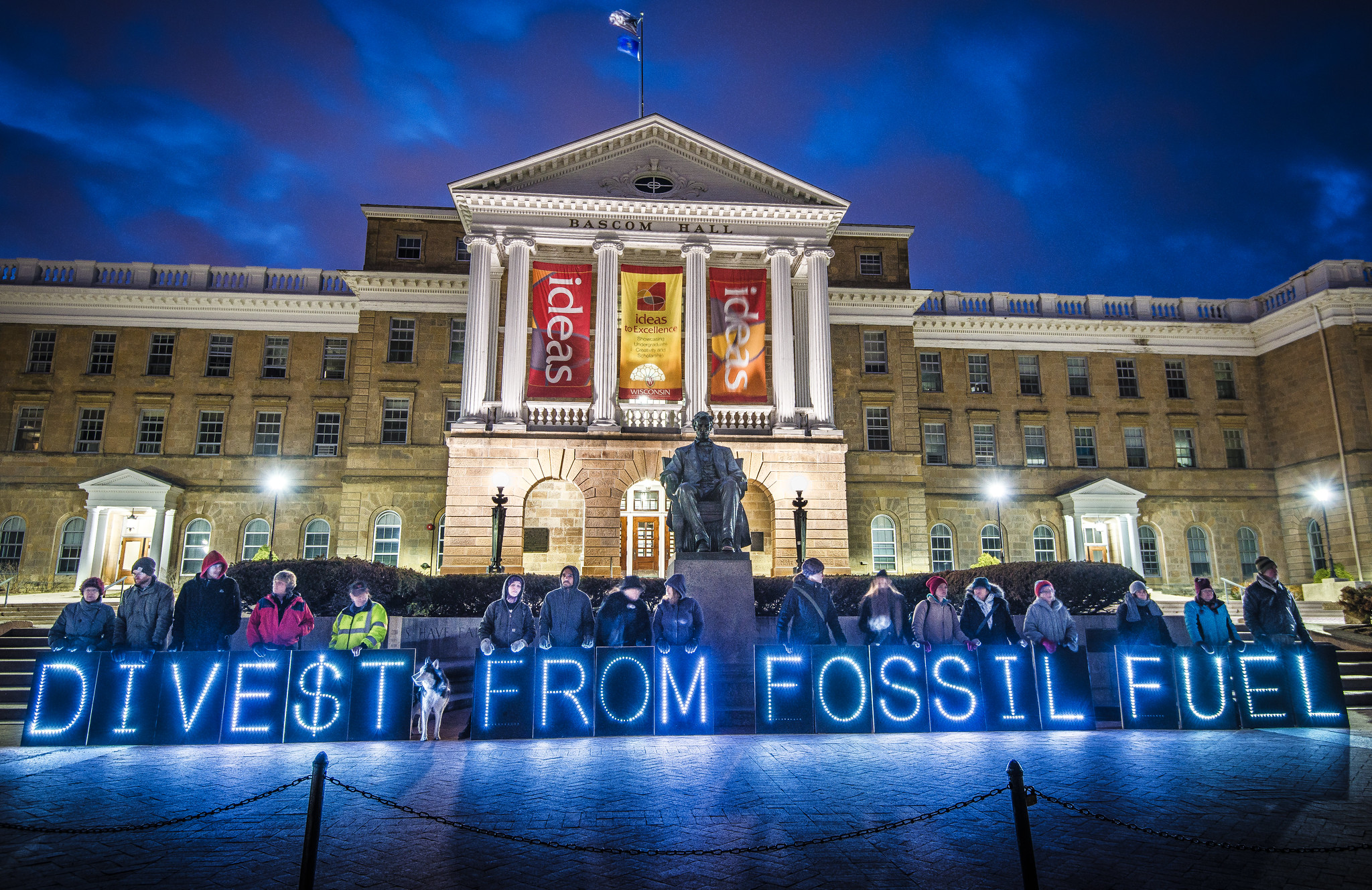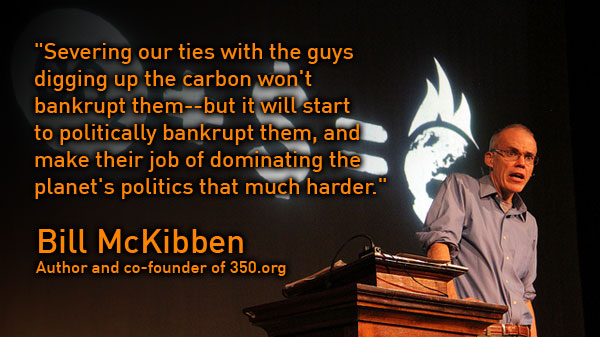NGOs, activists and especially policymakers need to stop pretending that the climate movement can succeed by pressuring capitalists to be more responsible, writes Ted Franklin.

April 4, 2014: Overpass Light Brigade, Bascom Hall, Madison, Wisconsin. (depthandtime/Flickr, CC BY-NC 2.0)
By Ted Franklin
Common Dreams
“After a decade of action, we are making a difference in the fight against climate change,” proclaims DivestInvest, the global divestment network. Dozens of leading climate organizations from 350.org to the World Council of Churches have enlisted as core partners or endorsers of DivestInvest.
According to DivestInvest’s website, 1,585 institutions have publicly committed to “at least some form” of fossil fuel divestment, representing an enormous $39.2 trillion of assets under management.
“That’s as if the two biggest economies in the world, the United States and China, combined, chose to divest from fossil fuels,” the site goes on.
DivestInvest’s 2021 glossy prospectus intimates that, thanks to divestment, the fossil fuel industry has begun to collapse. At the very least, oil and gas moguls should be trembling with fear that divestment activists will soon force them to close their spigots and relinquish their financial and political power.
If only this were true.
The balance sheets of the fossil fuel companies say otherwise. Instead of the industry tailspin portrayed in DivestInvest’s report, the fossil fuel giants are awash in record profits.
In 2021, The Hill reports, “the four largest oil and gas companies made over $75 billion in profits, returned billions to their shareholders through record dividends and share buybacks, and handed out millions in compensation to their chief executive officers.”
No. 2 U.S. oil company Chevron’s stock hit an all-time high of $186.13 on Jan. 26. After 10 years of divestment activism targeting the fossil fuel industry, loyal Chevron investors saw the dollar value of their nest eggs double. In April 2022 Chevron posted its highest quarterly profit in 10 years.
Worldwide fossil fuel production keeps rising. The U.S. government’s Energy Information Administration expects U.S. fossil fuel production to reach new highs in 2023.

Chart of Chevron stock price over the last 30 years. (macrotrends.net)
Clearly, whatever the value of the divestment movement, it is not hitting the fossil fuel industry where it hurts.
How can this be?
Divestment & Its Discontents
The divestment movement began in earnest when Bill McKibben penned”Global Warming’s Terrifying New Math” for the August 2012 issue of Rolling Stone magazine. McKibben’s article did not actually make the case that divestment would lead to financial pain for the fossil fuel industry, but rather that it would bloody the industry’s reputation and identify it as “Public Enemy Number One.”

Photo of Bill McKibben taken Oct. 16, 2013. (36O.org, Flickr, CC BY-NC-SA 2.0)
McKibben’s eloquent prose kicked off a campaign to pressure institutional investors to dump stock in fossil fuel companies. A group founded by McKibben and some university friends — 350.org — launched its Go Fossil Free: Divest from Fossil Fuels! campaign with the stated goal to “revoke the social license of the fossil fuel industry.”
McKibben went on a barnstorming tour across the country urging those concerned about climate to “Do the Math,” explaining the rationale behind divestment in strategic terms:
“The one thing we know the fossil fuel industry cares about is money. Universities, pension funds, and churches invest a lot of it. If we start with these local institutions and hit the industry where it hurts — their bottom line — we can get their attention and force them to change.”
The campaign spread rapidly from campus to campus. Many students got their first taste of collective action around climate. They learned basic skills of movement-building: organizing rallies, circulating petitions, knocking on doors, making speeches, devising slogans, pitching one-on-one in conversation, and creating posters, leaflets, and signs. Divestment provided clearcut targets and clearcut demands while leaving room for a variety of creative tactics.
Detractors

Christian Parenti in 2007. (David Shankbone, CC BY-SA 3.0, Wikimedia Commons)
Despite the obvious upsides, not everyone in the climate movement embraced McKibben’s call to place divestment at the center of climate action. Responding to McKibben, Christian Parenti, author of Tropic of Chaos and currently a professor of economics at the City University of New York, criticized 350.org’s focus on divestment in a 2012 op-ed that appeared on Common Dreams:
“[T]he spectacle of targeting the enemy — giving them a name and an address — is great but it needs to be linked to other forms of leverage.
Namely, we need to also focus on state power and what we can do with it. The movement should be demanding that government at every level move to contain and control Big Carbon and to directly support alternative energy. Regulation is the only thing that will actually check the industries — oil, gas, coal — that are destroying the planet.
I am all for dumping carbon stocks, if for no other reason than a sense of decency and honor. But how is dumping oil stock supposed to hurt the enemy? The boards of oil companies will be embarrassed? The spectacle of the discussion around divestment might provoke actions on other fronts — like legislation? I am not at all clear on how this is supposed to work. And I am not sure McKibben or 350 are either.”
Parenti got slammed by some for questioning a tactic that would enable us to “take back our money and our souls.” Parenti provided a nuanced defense of his position in an interview that appeared in The Nation. Over time, a few other skeptics appeared.
After the heirs of oil tycoon John D. Rockefeller announced in 2014 that their charity would be divesting from fossil fuels, journalist Matthew Iglesias wrote a short piece for Vox entitled “Does Fossil Fuel Divestment Work?” Iglesias explained that divestment neither deprives fossil fuel companies of capital nor drives down their stock prices, though it does inflict reputational damage on the fossil fuel industry.
Writing for The New Yorker in 2015, the philosopher William MacAskill addressed the question “Does Divestment Work?” and concluded, like Iglesias, that divestment campaigns might accomplish something, but not necessarily the kind of financial damage to the fossil fuel industry that activists unversed in industry economics often imagine:
“Divestment campaigns have the potential to do good, but only with caveats. To avoid the risk of misleading people, those running campaigns should be clear that the aim of divestment is to signal disapproval of certain industries, not to directly affect share price [emphasis added]. They should be clear that they aim to stigmatize the organizations (like fossil-fuel companies) that are being invested in, not those that do the investing (like universities, pension funds, or foundations). They should aim to maximize their media exposure. And, where possible, they should bundle the campaigns with actions that have larger direct effects, such as fossil-fuel energy boycotts, or with calls for specific policy changes.”
In April of 2018, the distinguished economist Robert Pollin and his coauthor Tyler Hansen of the Political Economy Research Institute, University of Massachusetts Amherst, published “How Well Does Fossil Fuel Divestment Combat Climate Change?” Their report was the first major scholarly study to evaluate the effectiveness of the divestment movement. Their conclusion:
“Divestment campaigns, considered on their own, have not been especially effective as a means of significantly reducing CO2 emissions, and they are not likely to become more effective over time.”
Ben Norton of the Real News Network presented Pollin’s conclusions and offered divestment advocates in the environmental movement an opportunity to respond. The divestment supporters more or less conceded that the value of their campaigns lay in removing validation, withdrawing social approval, and stigmatizing the fossil fuel industry — not in inflicting economic damage on fossil capital.
Let’s Stop Pretending

Raising the stern on a Bakken oil derrick. (Joshua Doubek, CC BY-SA 3.0, Wikimedia Commons)
After 10 years of divestment activities having consumed large amounts of activist energy and funding, it is fair to ask whether these moral appeals have run their course. Aren’t we already fairly well sorted out into people who admire well-run, energy-efficient public transportation, electric cars, and bikes . . . and those who are more comfortable riding around in F-250 trucks and giant SUVs? Who is left to proselytize?
A nonprofit-industrial complex thrives on this campaign, but it’s time to go back and review what Parenti presciently explained years ago in his response to McKibben. By focusing on pressure campaigns against private actors with no direct effect on the fossil fuel industry, well-intentioned people inadvertently delay the necessary struggle to win and engage state power to phase out the extraction and production of fossil fuels.
Indeed, doing so buys into the neoliberal logic that government can do nothing when, in fact, only government can shut down the fossil fuel industry. There is no evidence that the divestment strategy of persuading a quorum of capitalist financiers to abandon the most powerful and profitable industry on earth will achieve success before the planet blazes past 7.2 degrees Fahrenheit (4 degrees Celsius) of global warming.
As fossil fuel industry consultant Cyril Widdershoven observed last October, “The impact of these gestures is limited in an environment where demand is only increasing and returns are very impressive for those who do invest.” Thus divestment may even have the paradoxical effect of increasing future returns per share as the fossil fuel industry reaps record profits and uses them to buy back shares from divesting institutions.
So, What to Do?

Climate protest at U.N. COP26, Glasgow, Nov. 6, 2021. (The Left/Flickr, CC BY-NC-SA 2.0)
There is plenty to do that might actually have the desired effect of ending the fossil industries. It should be clear by now to everyone that the only effective way to cut fossil fuel production at the necessary pace and scale is by direct regulation of the fossil fuel industry.
NGOs, activists, and especially policymakers need to stop pretending that our climate movement can succeed by pressuring capitalists to be more responsible through market mechanisms like changing who owns the shares of companies that pollute. Remember that every divested share of a fossil fuel company winds up in a different investor’s hands. How does that stop the industry that is hell-bent on baking the planet?
This is not to say that all strategies focused on blocking investment are a misallocation of movement energies. Activists should fight tooth and nail against every specific attempt to finance the expansion of fossil fuel infrastructure.
Where activists can block the funding of particular projects by making them appear risky to investors or by campaigning against identified backers, their carefully targeted efforts to stop the money pipeline can be effective.
When activists discovered that the Bank of Montreal was actively involved in attempting to raise $250 million to fund construction of a coal export terminal in Oakland, California, they launched a reputational campaign against the Bank of Montreal, which then vanished from the scene, leaving the coal project floundering.
Limited energy, resources, and time would be best not wasted on divestment campaigns that have no identifiable impact on specific fossil fuel projects. A winning climate movement should offer more than symbolic victories.
Retired union attorney Ted Franklin serves on the coordinating committee and editorial board of the ecosocialist network System Change Not Climate Change, is a founding member of the Labor Rise Climate Jobs Action Group and No Coal in Oakland, and is active with many other groups struggling for climate justice and labor rights. He writes regularly on the many intersectional issues covered in Common Dreams.
This article is from Common Dreams.
The views expressed in this article and may or may not reflect those of Consortium News.

While this commenter usually likes joking insight… must compliment others (as I arrived rather late to the party).
Perhaps due to Saturday (aka Leisuretime)… what a wonderful bunch of dialogue!
To Jeff Harrison,
Yes: “CO2 cannot trap heat because heat is the kinetic energy of motion of atoms and molecules.”
But, in essence, CO2 IS the heat. It absorbs the infrared (IR) energy re-radiated by the earth after the earth has absorbed mainly visible wavelength energy of the sun. This absorption of IR increases the kinetic energy of the CO2 and, thus, the temperature of the atmosphere.
The other thing that will be ineffective is failing to identify the actual causes of the observed phenomenon. Here’s a hint. It ain’t carbon dioxide. CO2 cannot trap heat because heat is the kinetic energy of motion of atoms and molecules. That makes heat an attribute of matter just like mass, viscosity, or density etc and means that it has no existence outside of matter. So if you want to trap heat, you have to trap the matter that possesses it. See the coffee in your thermos. So you can reduce the CO2 in the atmosphere from its current level of 0.04% (four molecules per 10,000) back down to 0.03% of the atmosphere (three molecules per 10,000) where it was back in the early 50s when I was a kid if you like but it will not alter the increases in average temperature we are observing nor will it affect the meteorological disequilibrium we are also experiencing.
At times it works…at times it don’t: massif BOYCOTTS all over the globe. Hit someones pocket book and the language is understood. These endless demonstrations are taking us exactly nowhere. We need to attack them the way they attack us.
But the article argues that divestment does not hurt the oil companies’ pockets.
I never know how to respond to these debates. Much of the climate change debate is not grounded in reality. Our entire economy is founded on the cheap access to Hydrocarbons. Without dialing back our lifestyles to the year 1700 there is little that can be done to change that. Plastic is everywhere. We use Hydrocarbons to refine the minerals that we use in everything we do. Electric cars are presented as the solution with no awareness of the where the stuff that is used to make electric cars come from, or how they are made. Secondly, if we stopped using hydrocarbons tomorrow (assuming we did not starve) the poor of the world would be hurt the most. They never benefited from the Hydrocarbon gravy train, but they would pay the highest cost if the train stopped.
The other issue that is never addressed, is that of COMPLEXITY. The world we live in is extremely complex, and carbon is only one issue that is impacting our environment. Stopping the use of carbon does not address resource depletion, watershed over use, ecological degradation, poisoning of ecosystems, the military industrial complex, unfair distribution of resources, etc…
In terms of solutions, we would be farther ahead if we simply demanded that the life cycle of every product be extended. For instance, by passing “right to repair” legislation. If cars were expected to last on average 30 years. If electronic devices had to be repairable. If refrigerators had 20-year transferable guarantees, so that they had resale value and were not simply sent to the scrap yard. Perhaps putting 100% tax on single use products, while removing all taxes on the “lonely Maytag repair man”. Mandating dish pits everywhere, while putting 100 % taxes on single use pizza boxes.
A very big one would be to instruct public health officials that they were now being rewarded for getting rid of single use medical products, and developing disinfecting processes for all medical products so they were not sent to the incinerator.
Another big gain for the environment would be standardization of components so that parts were generally available for repairs, and appliances that were no longer working could be stripped for parts to be used in the repair of other appliances.
How about standardization of glass bottles and jars. In our recycling processes, we crush glass instead of reusing the jar. Crushed glass is sand, and most of the hydrocarbons used in glass production is in the heating of the sand to make glass. We would use a lot less hydrocarbons if we simply washed the jar and sent it back to the producer to have more product put into it.
The best part of this would be that the poor in our society would benefit, as they would be put to work repairing, washing dishes, collecting / disinfecting / redistributing for reuse pizza boxes, etc.
Carol Dansereau detailed the danger of the non-profit industrial complex taking over environmental movements and co-opting their ability to create change in her 2016 book What It Will Take. It’s a good read for anyone still deluded by the allure of professional activism. For decades, every time the environmental movement rooted in professional work has scored some kind of victory, the extractors and pollutors have served it two other surreptitious defeats. The reason why is simple: the giants have all the money and power. How could we have really hoped to challenge that power by empowering a small class of professionals with a paucity of non-profit money? It’s time to admit that that model of change has been an abysmal failure and move on. Real change (whether enacted from some government body or otherwise) is only going to happen with mass movements that stop relying on professionals to do the work.
Re “Go Fossil Free: Divest from Fossil Fuels! ”
The ONLY relevant, possibly effective “divestment/freedom” from fossil fuels is for individuals to drastically reduce their consumption.
While “NGO” means “Non-Government Organization” their actual function is more like “C”DGCCO’s >>> “Cleverly” Disguised Governmental Corporate-Coddling Organizations.
Use any “neutral” search engine for “NGOs as CIA cut-out”
“Disassociating from fossil fuels.” Really ??? May I suggest the supporters of this dream world, take a closer look at what products are derived from Fossil fuels, besides fuel to run our transport systems. It may come as a huge surprise, that fossil fuel, after going thru the refinery comes out at the other end as a host of products that modern society cannot do without. Take a good long hard look at PLASTICS, types thereof ,and useage there of. We even use the stuff to make clothing materials that replaced cotton and Hemp to a large degree. Even fertiliser is derived from Fossil fuel, how are we going to replace that ? Modern society has ensured it’s slavish lock in with fossil fuels today, it cannot disengage from it for a very long time. So all this rabbitting on about turning our backs on fossil fuels, means the supporters of this, have no real idea of how embedded within our society the products of fossil fuel is. I have not seen just ONE suggestion being offered, to be introduced to replace the source of fossil fuels, to manufacture anything that currently is made from Fossil fuel other than fuel for transport.
Eddy. Spot on !
Maybe some of these protesters should commit to spending just one month without using anything derived from fossil fuels. No smart devices, no coffee machines, no water bottles, no cars, no buses, no bikes, no medical machines, no fleeces, no shoes, no perishable foods, no heart pacemakers, etc, etc.
Of course we can do better, but let’s not throw baby out with the bathwater. Use of fossil fuels has given humanity the ability to progress, grow and live in comfort. Do we really want to return to the stone age ?
The green movement is politically and financially motivated and completely divorced from actual science. These green meanies are leading humanity over a cliff to certain suicide. Maybe the believers of this lunacy should save the planet by exiting the human race and leaving the rest of us to our comfortable fate ?
SOYLENT GREEN NEW DEAL:
EAT THE RICH!
This is something of a half-truth:
1) For divestment to work, we cannot just divest on Wall Street; we have to divest at the pump. As long as the business is making money, letting it be owned by fewer people is not likely to be effective coercion.
2) The notion that we need to rely on federal regulation within the US is dangerous falsehood. Useful regulation will not happen. The industries, with others with whom they are cross-invested, regulate government. This is why the only non-Neoconservative president since 1980 has been the marquee buffoon Donald Trump. This is why studies find zero statistically significant correlation between governmental policy and popular opinion.
The US is in no functional sense a democracy. That means that popular interest will not be represented by regulation.
Perhaps we are not all ready for a profound re-integration: food has only doubled in price, for present. The percentage of homeless is still less than in the 30’s. The world has only just left the petrodollar this year. Even Europe managed to get through a mild winter despite Biden bombing Nordstream II. Of course it did so largely on reserves. And, of course, unless there’s a nuclear war, or accident, most of us are likely to survive policy for a few years.
No, we will be in this until we have constructed an alternate economy, or until the economy that has purchased the US government fails.
it really seems to me like it’s time people got started with something new either way. You don’t have to drop out and move to the Yukon or whatever. There are a lot of reasons to start with small steps. But if you’re going to start with small steps, it’s best to start early.
This should all be obvious by now…..but getting governments to regulate and more closely monitor oil and gas is difficult as well…. carbon pricing is one thing we can support our governments in doing……but we also need robust plans for transition…..and governments that serve ALL the people………..not just the well off heels that continue to support industries hell bent on taking us past the climate tipping point.
You will find with a bit of research that the fossil fuel industry is the reindustrialization fuel supply through 2050.
In short, all the information of the day show the climate movement aligned with the globalists (Read Agenda for the Planetary Bargain report of 1976 to the Senate by Council of Foreign Relations member Harland Cleveland. Yes it’s that far back and more of a long unfolding agenda.).
The policy elites have planned destruction and fear in mind to push the agenda to public acceptance in the worse propaganda campaign going. It’s really a self fullfilling prophecy with a goal of world technocratic world government, with us being along for a very, very wild ride.
I was one of many persons who did the necessary research to show that it (climate change) wasn’t unsolvable at all and did not require a reindustrialization globally, in fact we could even phase out completely nuclear power. I gave my first presentation at UNM in the 1990’s with 6 PhD’s on the panel with me. None, none refuted my demand supply reduction analysis.
I did another talk in 2018 as the main Ecoaction speaker at the Green Party national convention with essentially the same analysis using the new data available from Drawdown, the book released by Paul Hawkin.
And yes, I practice what I preach, that economy and ecology goes hand in hand.
As for the globalists, they will be the ones to take us over the perceived brink with states playing directly into their hands .
The environmental movement has always emphasized clean energy transition and ignored energy security. This is an epic mistake, as most people won’t be worrying about the climate when they are living in uncomfortably hot or cold homes without electricity. Until the problem of secure clean energy is solved, it will be tough going for climate activists and those who support them.
One problem with the strategy is that largest projects in “carbon exploration” are made by companies that do not require financing, using retain profits instead. Then there are venture capitalist companies, pooling money from larger investors for more speculative projects. The second problem is that demand increases in developing countries that now are responsible for more than 50% of consumption, and lopsided majority of growth. So the largest fruit to pick is to create a packet of technologies that would provide alternative, and alternative that allows for development, which means, at most comparable cost with carbon.
Right now, China is the most affordable, and massive, producers of solar panel components, and USA is on a warpath against them. I suspect that the same may be the case of wind power because of the scale of wind projects there.
In the same time, nuclear projects of RosAtom, compared with American or French companies, offer half the construction time and half the cost. And we are on a warpath with them. And fantastic schemes of using batteries to insulates us from effects of unreliable nature of green power (most of all, wind, but also solar where clouds are frequent, not to mention snow) are impractical in the West while totally impossible in, say, India or Kenia.
Third, the West, most of all, USA, provides resource-intensive templates of status consumption. Homes must be big, private vehicles must be big, vacation trip must use RVs and so on. I bet Bill Gates’s farm that RV, even if electric (a possibility, I guess), has order of magnitude larger “imprint” than a tent or two. The idea that you can have family fun in nature with a subcompact car is totally alien (but practiced by your truly in younger years). Untold billions were spend to brainwash people into believing that pleasure means having big stuff. Including oversized food portions, which relates to carbon to.
Absoluetly, dead right. In Australia there recently was a survey trying to discover why families prefered S.U.V.’s instead of compact sedans. Really weird question, as it’s easily answered. Not too long ago we had the hunble station wagon, which was used as general purpose use. It came in handy to cart all sorts of items within it, from new furniture to the kids with all their friends going on a camping trip. Shopping using a station wagon was a breeze. Then the manufacturers claimed demand had dropped and they were phasing them out. People got caught short and started looking for replacements. For example, last week my wife and I bought a new washing machine, we were told there was a delivery fee charged to deliver it which we found to be exhorbient. Fortunately, I have a station wagon of sorts, and the package fitted nicely once the rear seats were laid down. OOPS, naughty me, I did not mention it was a 4W.D. In any case, families need an all rounder vehicle to cater for their needs. The auto industry belatedly discovered this need by the popular demand, and started to manufacture what people were demanding. That’s why S.U.V.’s have become so popular today, they are a useful family vehicle suiting a host of different uses. I notice too, lots of talk these days of 15 minute cities, riding around on bicycles/walking/scooters, but nowhere within that discussion, is consideration being given for the elderly, can’t see them ridding bicycles/walking/scooters. How are these folks supposed to do their shopping, lugging home heavy shopping bags when they can hardly walk ? I’ve just completed our weekly shop and the bags being loaded to the car, were HEAVY, and we’re expected to carry them whilst walking home ???? No, delivery doesn’t cut it, we tried that, and all we get is fruit/veges with only a day or two left being edible, even tinned food added , was always with a week of two of it’s use by date. We got the message deliveries were an ideal means of disposing of groceries with a fast approaching use by date. How are they supposed to visit their Medical facilities which in our city, are 3/4’s of a day on public transport to even just reach ? It seems to me, people rabbit on about their favorite topic they picked up in the MSM, without really giving deep thought of what they’re really talking about, and the ramifications such actions would have on their day to day life.
From all signs and odd logic it seems a classic misdirection play to enlist the “right thinking” population on what is surely to be another dead-end, hot-air issue with manufactured consent at its core.
This situation presents yet another rope-a-dope charade in which all the familiar ideological schisms can played, and expanded.
This formula would not be so easily foisted upon an informed thinking public.
Banks and transnational corps have coopted the environment movement.
They found a way to commodify it, specifically CO2 which is required for all of life on Earth. Yes pollution is the problem and general degradation caused by capitalists who are pushing the CO2 net-zero mantra. They’ve created a market of this – Blackrock in much of the lead.
And they’re using the various factions of the movement that are now bought and paid for – Bill McKibbon’s 350.org is funded by Rockefeller Foundation. Follow the money.
Present conditions will continue apace under our global capitalist system. period. …..And, there’s no need for exculpatory modifiers like, “CRONY capitalism”, or, “LATE STAGE capitalism”…..and others. It’s just capitalism, itself.
The many anti fossil fuel non-profits, while well intentioned, serve as outlets for virtue signaling among bourgeois upper middle class folks. They can donate some money, mention that to friends, and then not have to think anymore about our collapsing biosphere, because, after all, they contributed to ‘the cause’. ………and, yes, as the article shows, these anti fossil fuel campaigns are ineffective.
However, addressing climate change at the national level only is also ineffective. Nothing less than a coordinated global cooperation/pact to rapidly transition away from fossil fuels will have an impact. Either all in, or……forget about it.
……. The same goes for effectively eliminating a viral pandemic. …….. As admirable as China’s zero-covid policy was, it was only a matter of time until international pressure from the West/financial capital to ‘OPEN UP!” would result in China dropping that policy. ……Many virologists have lamented how a GLOBALLY coordinated zero-covid policy at the onset of this pandemic woulda’ eliminated the coronavirus in six to eight weeks. ….. Instead, three years later, we’re still looking at some 500 deaths a week from covid across the US. (not to mention the ravages of Long Covid that beset tens of thousands). ………..
When it’s all said and done, the very existence of our global capitalist system ensures the trajectory of biosphere destruction.
……….. Just as feudalism gave way to capitalism, capitalism must now give way to a global eco-socialist model of organizing society.
CORRECTION——> NOT 500 covid deaths a week in the US. …..It’s currently between 300-400 A DAY.
Yes, that pretty well sums it up. Capitalism is the problem and all of us are tied up in it. Those who entirely opt out find themselves on the margin of the social system, and they can be easily swept away. The ‘back to the land’ movement of the 1960s, as an example.
Capitalism will bring about its own decline and fall due to its inherent requirement for growth, which cannot continue on a planet with finite limits. But capitalism will keep going as long as it can, with its own self-reinforcing mechanisms. So, when it ends, it is not likely to be a graceful ending.
As for the fossil fuels, they are a limited resource and we are already past peak oil and on the down-slope side of petroleum extraction, and at or near the peak for coal and natural gas. Oil production will be down to specialty uses by the end of this century, at current rates of extraction. Coal and natural gas production could extend for another century or so, before the extraction cost exceeds the value of the product.